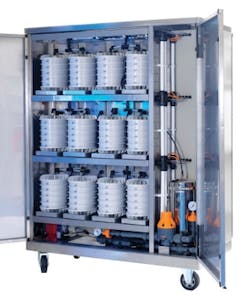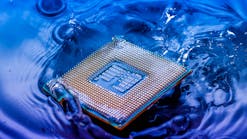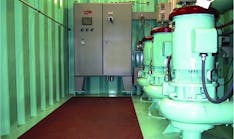Cooling towers are an essential part of industrial processes. In order to prevent scaling, corrosion and biofouling a mix of chemicals is added to the cooling water. In addition, regular blow down is used to prevent the conductivity of the system from exceeding recommended levels. This leads to large quantities of water and chemicals being flushed away as waste, with the associated costs.
Voltea, a spin-off from Unilever, has developed a water conditioning technology called Capacitive DeIonisation (CapDI) that is designed to remove dissolved salts from a variety of water sources ranging from tap water and process water to brackish ground water and also cooling towers.
The basics of the CapDI system are simple. Ions pass through an electrical field and are temporarily stored on porous electrodes. When the electrodes are saturated the electrical field is reversed and the ions are released in a small concentrated stream and the process can start again. During the regeneration, ion selective membranes prevent the ions from passing to the opposite electrode effectively trapping the ions in the waste stream. This allows for a thorough cleaning of the electrodes during the regeneration cycle and prevents fouling of the electrodes.
CapDI can be used in a variety of industrial processes. One of its key uses is in re-circulating cooling systems where it offers water and chemical savings and boosts the performance of the cooling system. Up to 40% water savings and 80% chemical savings are achievable.
The water and chemical savings are a direct result of the system's ability to remove salts from the make-up water. Consequently the cooling system can be operated at five times higher cycles of concentration (CoC). For example a cooling system initially operated at CoC of three, can be operated at CoC of 15 with CapDI.
The system can be installed with very little risk. Since the water composition of the re-circulating water remains the same, there is no need to alter the existing chemical treatment program. What is more, it provides the opportunity to boost the performance of the chemical treatment program: less corrosive or lower scaling conditions can be set in the recirculating water, while still enjoying the water and chemical savings. For example, the cooling system can be run at a CoC lower than 15, for instance a CoC of 12, where conditions are less challenging, but even at this level the water and chemical savings are still significant.
Voltea recently announced that it has completed a $4.58 million financing round to support the commercial roll-out of its CapDI technology. The technology is the result of over 10 years of government and commercial R&D and reportedly offers the first clean desalination systems capable of high water recovery and chemical-free operation, while consuming substantially less energy than alternative technologies.
Voltea says CapDI systems are scalable and have already been proven effective in industrial cooling systems. Since the system is a plug-and-play technology, it can be retrofitted to any cooling tower system, from small to large.


